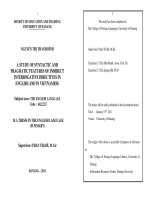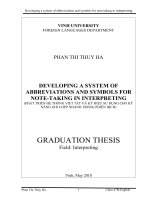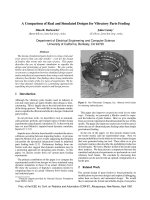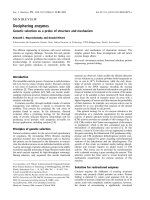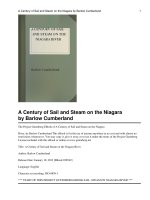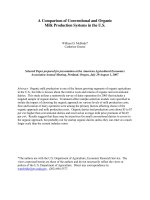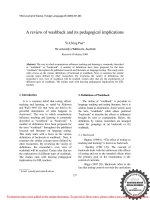newspaper russian a vocabulary of administrative and commercial idiom
Bạn đang xem bản rút gọn của tài liệu. Xem và tải ngay bản đầy đủ của tài liệu tại đây (5.59 MB, 133 trang )
NEWSPAPER RUSSIAN
The author
John Slatter, B.A. (Cantab.), M.Soc.Sci. (Birmingham), Ph.D.
(London), FRSA, member of the Humanitarian Academy of the Arts,
St Petersburg, is Lecturer in Russian in the Department of Slavonic
Studies, University of Durham.
NEWSPAPER RUSSIAN
A VOCABULARY OF
ADMINISTRATIVE AND
COMMERCIAL IDIOM
With English translations
John Slatter
UNIVERSITY OF WALES PRESS
CARDIFF
2000
© John Slatter, 2000
British Library Cataloguing in Publication Data.
A catalogue record for this book is available from the British
Library.
ISBN 0-7083-1634-4 paperback
ISBN 0-7083-1633-6 hardback
All rights reserved. No part of this book may be reproduced,
stored in a retrieval system, or transmitted, in any form or by any
means, electronic, mechanical, photocopying, recording or
otherwise, without clearance from the University of Wales Press,
6 Gwennyth Street, Cardiff, CF24 4YD.
www.wales.ac.uk/press
The right of John Slatter to be identified as author of this work has
been asserted by him in accordance with the Copyright, Designs and
Patents Act 1988.
Typeset at the University of Wales Press
Printed in Great Britain by Dinefwr Press, Llandybïe
INTRODUCTION
Scope and purpose
The Russian press has undergone huge transformations in the years
since the death of Konstantin Chernenko in early 1985. Every
change at any level in Russia in the supervening period has been
reflected in its press. Ïåðåñòðîéêà (Perestroika) has been followed
by the economic ‘cold shower’ of early post-communism and then
by the less dramatic but still inexorably transforming period of
reform under successor prime ministers and presidents: all these
have wrought tremendous changes in Russia’s political landscape.
In particular the relatively free elections have been reported on in
detail in the local and national press although with more interest in
personalities and personal lives (the age of êîìïðîìàò –
kompromat or compromising material) than might be the case else-
where. The ongoing struggle between the president and the govern-
ment on the one hand and the Duma on the other has received
considerable, even obsessively detailed, coverage in the Russian
press. The fluctuating relations between the various political parties
in the Duma have been an additional focus of attention, although
the title of ‘political party’ must be in doubt: it is certainly difficult
to devise a definition of political parties which would cover both
the great ideological blocks seen in Western political life and the
factional groupings, usually dominated by a single individual or
small group of individuals, of the Russian Duma. Interestingly, of
late the 1920s term ‘faction’ (ôðàêöèÿ), with its somewhat negative
overtones, has been revived to describe these groups. Finally there
has been a great deal of interest, understandably, in the influence of
groups and personalities outside the sphere of politics proper: the
v
‘oligarchs’ of the large corporations – especially media owners –
with their inevitable political demands, and the ‘family’ (including
some ‘oligarchs’) in the president’s entourage.
Much of the coverage of the Russian economy in Russia’s press
has concentrated, often in mixed fascination and horror, on the
root-and-branch changes which it has undergone. The economy,
despite complaints from various quarters at the slowness of
change, has still been privatized at an unheard-of rate. Ownership
of the Russian newspaper and periodical press has therefore also
been transferred largely into private hands. In turn, ownership of
the economy as a whole has been a major preoccupation of the
writers and editors of Russia’s newspapers and magazines. Not
least important here are the relations between the newspapers and
various political groups, and between the newspapers and various
members of the ‘oligarchy’ of the rich and powerful, often thought
to exercise an undue influence on events.
Changes at the levels of the polity and the economy have also
been reflected, albeit in a less certainly predictable manner at the
time of writing, in Russian society. To the former three ‘non-antag-
onistic classes’ of Soviet society – workers, peasants and employees
– has been added a class without a name, the ‘new Russians’ (íîâûå
ðóññêèå), the entrepreneurs and traders of post-Chernenko Russia,
recruited in part from moonlighting state employees, in part from
the old Communist Party šlite and in part from the young, newly
emergent into the brave new Russian world of work and ownership,
wealth and power. The question often asked, whether there has
been created or has grown in size a Russian ‘middle class’, can begin
to be answered affirmatively. Key groups of professionals of the sort
which form the core of the middle classes of Western Europe,
notoriously doctors and teachers, may not have sufficient earning
power to feel full identification with the new Russia, but the middle
earners of Russia nowadays – from executives and lawyers down to
stall- and booth-keepers – are starting to emerge as a group broadly
supportive of the new order even if, as yet, they do not have a solid
group identity or ‘class consciousness’.
Introduction
vi
All these developments have been reflected in the new Russian
press: its conditions of production, its owners and employees
outlooks, its main fields of interest, and its readers expectations.
Many organs have not survived or have survived only in a
radically altered form. Who, in the mid-1980s, would have
predicted that ẩỗõồủũố would be, not the official journal of a
rubber-stamp parliament, but one of the leading liberal organs in
the country? Who would have said that ẽõọ, once the mighty
mouthpiece of the ruling party, would ever experience serious
financial problems and declining circulation? Who could have
listed even the titles of the most respected papers of the present
day: ẹồóợọớ, ấợỡỡồủớũỳ and ồỗõốủốỡ óỗồũ
still less those of their tabloid companions, èợủờợõủờốộ
ờợỡủợũợởồử, ẹợõồứồớớợ ủồờồũớợ and the like? Who would
have predicted that such titles as these, and numerous others less
respected than them, would come to rely to an overwhelming
extent on advertising, including numerous small ads, for their
revenue? Who could have foreseen the enormous growth in the
size, importance and variety of the provincial press, comprising
upwards of 10,000 titles at a mid-1998 estimate?
Neologisms and foreign borrowings
As a result of all of this change around them, Russian newspapers
and magazines have changed beyond recognition in both style and
content. The political vocabulary has widened to include all the
linguistic means necessary to describe that open political battle,
whether during election campaigns or during Duma sessions,
which has replaced the stifling conformism of Communist politics
in the years of stagnation. Some of this has been borrowed from
abroad, mainly the Anglo-Saxon world (ùởỡồớũ, ủùốờồ)
unlike earlier periods when Russian borrowed from French or
German. However, increasingly of late there has been a tendency
to nationalize political vocabulary (ỏợởợũợ, úùõởồớồử), with
many expressions creeping back from the pre-Gorbachev Soviet
Introduction
vii
period (ứồụủũõợ, ủũốừốộớỷộ). The vocabulary of ỏốỗớồủ, the
new Russian economics, has had to be sourced largely from
English as that is the international language of business.
Anglophones should not assume that widespread borrowing
from English necessarily makes linguistic life easier for them.
Borrowings are often employed with different meanings, and even
sounds, from their originals in British or (more often) US English.
Cottage gives ờợũũồọổ, but ờợũũồọổ does not denote a small
rural dwelling: a ờợũũồọổ is the suburban home, often with
several garages and quarters for servants and security staff, of the
new Russian businessman and his family. (Note that this is not
likely to be a businessperson: there is little sign yet of anti-women
attitudes disappearing, while downsizing of firms and institutions
has often led directly to an increase in the numbers of Russian
housewives. As the Russians still say, ờ ớồ ỷỏ, ỏỏ ớồ
ữồởợõồờ.) An increasing number of Russian words now end in
-ốớó. ốụốớó and ởốỗốớó seem straightforward enough. But
beware of the apparent rule that lays the stress on the syllable
before -ốớó, thus giving ỡợớốũợốớó. For those aware of the
restressing of borrowings into Russian ốủũồỏởốứỡồớũ and
ờồọốũợ for instance this will be gloomily familiar
information.
A further caution: many headwords are not defined in their full
range of meanings. This is not a dictionary of the Russian language
as such. Newspaper language does comprise some specialized
words rarely found outside the press, but it also includes many
more words used in senses different from those employed in
common language. For instance, I have not thought it necessary to
provide a definition of ồủũ in relation to persons, whereas its
use in relation to objects, in particular to property, is more
specialized and unexpected: it is therefore defined in that
meaning. Sentences are used, according to the house style of the
series, to illustrate the meanings of the headwords. These
sentences are taken from the press of the last few years. Most
relate to Russian politics, though some examples are about other
Introduction
viii
areas and subjects. I have changed personal names cited in the
originals both in order to avoid reproducing potentially actionable
statements and also, optimistically, so as not to confuse future
readers for whom Stepashin, Kirienko, Primakov and company
may be unfamiliar names.
The ‘New Russia’ and its press
The ‘new Russians’, as well as owning the press, have supplied a
large part of its subject matter (rather as, in classic Hollywood, life
as lived by film actors and producers formed a disproportionate
amount of their films’ subject matter). The ‘seriousness’ of the pre-
Gorbachev press has been superseded by a widening of interest to
areas of life previously thought trivial or irrelevant: prurient
interest in the life of celebrities and the wealthy, which in the
Western press would almost certainly attract the attention of the
libel lawyers; detailed and bloodily frank reporting of crime;
fascination with sport carried over from the Soviet period; and a
new enthusiasm for the entertainment world, especially at its
‘pop’ end, etc. Much of this is treated with an attitude which
makes the tabloid press elsewhere seem the soul of discretion and
sensitivity.
Precisely because it is both a barometer of the public mood and,
directly or indirectly, decisive in forming society’s ideas and
opinions, the Russian press is deeply interesting and worthy of
study. It is the author’s hope that this book will make that study
easier and that interest more widespread.
It is assumed that the user of a book such as this will already
have a knowledge of basic Russian grammar, including inflections.
The headwords include many rarer words or neologisms, and in
addition a considerable number of frequently used words which
have acquired rarer or more specialized meanings related to their
use in those matters frequently dealt with in Russian newspapers.
The same is true of a number of phrases or expressions which,
while present in common language, enjoy a special or greater
Introduction
ix
currency in newspaper speech (such as ‘wild horses would not
drag’, ‘pouring oil on fire’, etc.). These more frequently used
words and phrases are also given here since much of ‘newspaper
language’ is also, or will soon be, common language. In this way,
newspapers act as laboratories of language: they pick up and
propagate expressions already in use in common language, and
also invent those which will soon be adopted into common
language. In an analogous way, at the level of thought, they both
express existing public moods and initiate changes in public
opinion.
What is contained in each entry
Use of sentences, supplying the context for most entries, should
eliminate the need for a large part of the semantic information
general dictionaries contain. I have tried where possible to find
examples which illuminate the definition given at the end of the
entry. In a number of cases where an unfamiliar headword is
usually or always part of a phrase with familiar words, I have
defined the phrase as a whole in italics within parentheses at the
end (for example see the entry for âà-áàíê). Therefore much of
the usual matter contained in dictionary entries is dispensed with
(transliteration of the headword, semantic categorization, field
and register labels, etc.). There is one departure from the usual
style of this series, demanded by the peculiarities of the Russian
language itself, in particular its highly mobile stress system
with which students of Russian at any stage will be ruefully
familiar: that is, that the stressed syllable is indicated for all
headwords, but not in the example sentences. Each entry therefore
consists of:
(1) the stressed headword(s) with stress shown as the syllable
following the apostrophe – apart from ¸ which is always stressed –
in bold;
Introduction
x
(2) very brief lexical notes on the headword(s) in ordinary type
and parentheses;
(3) the example sentence(s) in normal type with the headword(s)
picked out in bold;
(4) the translation of the word in italics and within parentheses,
and defined in that context (for example, if in the sentence the
headword is plural then in the definition it will also be plural).
In keeping with the style of the series, only the minimum of
necessary lexical information is supplied for each entry. The
imperfective infinitive of verbs, where available, is given first.
Where only one infinitive is given, its aspect(s) is/are indicated.
Unless indicated otherwise, verbs take the direct object
accusative. Headwords derived from other headwords, such as
nouns derived from adjectives, are treated as separate from their
parents. The exception is for participles, which have been treated
as separate headwords only where their meaning(s) seemed to me
to be sufficiently distinct from those of their parent verbs, that is,
where they have attained the status of adjectives or nouns. I dare
say that this flexibility will have led to the usual quota of
inconsistencies though I hope none really confusing and ask
for readers forbearance for both this and any glaring omissions,
which I have naturally striven to avoid.
Russian alphabetical order
Knowing the order of the Russian alphabet will be a considerable
help in using this dictionary as a reference work. The order of the
letters in the modern Russian alphabet is:
, , , , , , ă, ặ, ầ, ẩ, ẫ, ấ, ậ, è, , ẻ, ẽ, é, ẹ, ề, ể, ễ, ế,
ệ, ì, ỉ, , , , ĩ, í, ị, ò
Introduction
xi
Conventions and abbreviations
The following conventions and abbreviations are used
throughout:
’ precedes the stressed vowel in the headword,
(as in àóäèò’îðèÿ)
(acc.) accusative case
(adj.) adjective
(adv.) adverb or adverbial expression
(dat.) dative case
(f.) feminine noun
fig. figuratively
(gen.) genitive case
(impers.) impersonal verb
(impf.) imperfective (aspect or infinitive)
(indecl.) indeclinable
(inst.) instrumental case
lit. literally
(m.) masculine noun
(n.) neuter noun
(p.p.) past participle
(pf.) perfective (aspect or infinitive)
(pl.) plural
(pr.) prepositional case
(prep.) preposition
(r.) reflexive verb
US American usage
[ ] encloses matter which may be omitted.
Introduction
xii
õớủ (m.): ợởóố ỗùởũỷ õỷùởữồớỷ ọợ ùồở, ũồùồỹ ổọáỡ õớủ
ớ ỡộ (advance payment)
õốộớợủũỹ (f.): ể ớủ õ ủũớồ õốộớợủũỹ ớ ọợợóừ õ ýũợỡ óợọú
ọợủũốóở ớồỏỷõởỷừ ỗỡồợõ (accident rate)
õũợỡũốỗửố (f.): ữởỹớốờ õũợỡũốỗửốố ố ờợỡỡúớốờửốộ
ợõợủốỏốủờõớồứũợóỏớờ (automation)
õũợợũõồũữốờ (m.): Oớ õờởỵữốở õũợợũõồũữốờ ố ùợủởúứở ủợợỏựồớố
(answering machine)
óồóũ (m.): ợũ ờờ õỷõợỗũủ õũợỡợỏốởố ốởố ờúùớỷồ óồóũỷ
(units)
ọồủ (m.): ẻỏõốớồớố õ ọồủ ẽồỗốọồớũ ủợ ủũợợớỷ úỡỷ ớồ õủồóọ
ợùõọớỷ (aimed at)
ọồủớỷộ (adj.): ẩủùợởỹỗợõớốồ ủồọủũõ óợủùợọọồổờố úóợởỹớợộ
ùợỡỷứởồớớợủũố õởồũủ ỏợởồồ ốởố ỡồớồồ ọồủớỷỡ (appropriate)
ổốợũổ (m.): ẽợọổ ờửốộ õ ỏợởỹứợộ ùợỡỷứởồớớợộ ụốỡồ
ủợùợõợổọởủỹ ổốợũổồỡ (hoo-ha, hype)
ờũốõốỗửố (f.): ẽõốũồởỹủũõợ éễ ủũồỡốũủ ùồổọồ õủồóợ ờ
ờũốõốỗửốố ýờợớợỡốữồủờợộ ọồũồởỹớợủũố (activation)
ờũốõỷ (m. pl.): ợỗớốờở ợùủớợủũỹ, ữũợ ờồọốũợỷ, ớồ ùợởúữốõ ọồớỹóố,
ỏúọúũ ùồũồớọợõũỹ ớ ờũốõỷ ỏớờ: ớồọõốổốỡợủũỹ, õũợỡợỏốởố,
ửồớớỷồ ỏúỡóố ố ũ. ù. (assets); ỡợũốỗốúồỡỷồ ờũốõỷ (de-
preciating assets); ởồóờợồởốỗốúồỡỷồ ờũốõỷ (liquid assets);
ỏợữốồ ờũốõỷ (working assets); ữốủũỷồ ờũốõỷ (net assets)
ờửốợớồớỷộ (adj.): ẽợờ ữũợ ợớ ợủũáũủ ùồỗốọồớũợỡ ờửốợớồớợộ
ờợỡùớốố ôẹốủũồỡỷằ (public limited company)
ờửốợớốợõớốồ (n.): ìũợ ỡồứởợ ùố ờửốợớốợõớốố ợỏỳồọốớốũỹ
ỗõợọ ủ ủợũớồộ ọúóốừ ủũợóợ ồổốỡớỷừ ùồọùốũốộ õ ờờợồ-
ớốỏúọỹ éẻ ôéúủủờốồ ờồũỷằ? (share-creation)
1
ờửố (f.): ẽốõũốỗửố ýũợ ùợọổ ờửốộ óợủúọủũõồớớợóợ
ùồọùốũố (shares); úỏồớũợ ùồọùốỡồũ ờờúỵ-ũợ
ùợởốũốữồủờúỵ ờửốỵ (act)
ỡỏốửố (f.): ẽồỡỹồ õủá õớợ õỷởồũồở ốỗ ồởợóợ ọợỡ õ ũợũ ủỡỷộ
ỡợỡồớũ, ờợóọ ấồỡởỵ ùợờỗởợủỹ, ữũợ ú ớồóợ ũợởỹờợ ữũợ ùợõốởốủỹ
ỡỏốửốố ớồ ùợ ớóú (ambitions)
ỡớốủũố (f.): ữồủũỹ ủồóợọớứớồóợ ùỗọớốờ ẽồỗốọồớũ ợỏỳõốở
ỡớốủũốỵ (amnesty)
ớởốũốờ (m.): ẻỏỳủớ ùốữốớỷ, ùợỏúọốõứốồ ầùọ ớữũỹ ỏợồõỷồ
ọồộủũõố ùợũốõ ịóợủởõốố, ớứố ớởốũốờố ùợọữáờốõỵũ
ọợõợởỹớợ ýờỗợũốữồủờốồ õồủốố (analysts)
ớởợó (m.): ẽợ úổồ ùợởớợủũỹỵ ợũờỗũỹủ ợũ ốủùợởỹỗợõớố
ỏỵọổồũớỷừ ủồọủũõ ớ ỗờúùờố ốỡùợũớỷừ ũợõợõ ùố ớởốữốố
ợủủốộủờốừ ớởợóợõ (equivalents)
ớớồờủốợõũỹ (impf. and pf.): èợờờợ, ỏỷõứ ốủùớủờ ờợởợớố,
ỏỷở ớớồờủốợõớ ờợợởáỡ ếủớợỡ II õ 1974 óợọú (annexed)
ớớồờủố (f.): ớớồờủố ầùọớợộ ẹừỷ ỡợờờớủờốỡ óợủúọủũõợỡ
ùợốỗợứở õ 1974 ó. (annexation)
ớớúởốợõũỹ (impf. and pf.): ủõợáỡ ốủờồ é ùợủốũ ớớúởốợõũỹ
úờỗ ẽồỗốọồớũ ợũ 25 õóúủũ (quash, cancel)
ớũốọồỡùốớóợõỷộ (adj.): ỡồốờớửỷ úóợổỵũ ớỡ õõồọồớốồỡ
ớũốọồỡùốớóợõỷừ ủớờửốộ õ ợũớợứồớốố õõợỗợõ ùợọúờửốố úủủờốừ
ủũởồởốũồộớỷừ ỗõợọợõ (anti-dumping)
ớũốỡợớợùợởỹớỷộ (adj.): èồỷ ùồọởóỵũủ ủỡỷồ ỗớỷồ, ợũ
ùợọợởổồớố ờỡùớốố ùợ ôỗữốủũờồằ ỏồớỗốớợõợóợ ỏốỗớồủ
ớởợóợõỷỡố ố ớũốỡợớợùợởỹớỷỡố ủởúổỏỡố ọợ ợóớốữồớố
ýờủùợũ ủỷợộ ớồụũố (cartel-busting, [US] trust-busting)
ùồởởốợõũỹ (impf. and pf.): ấớọốọũ ùồởởốúồũ ờ ọợủũũợữớợ
ứốợờốỡ ủởợỡ ớủồởồớố (appeals to)
aùồởởửố (f.): ọõợờũ ớỡồồớ ùợọũỹ ùồởởửốỵ õ ủợợũõồũủũõúỵựốồ
ốớủũớửốố (appeal see also ợỏổởợõớốồ)
ồớọ (f.): ẻọốớ ốỗ óởõớỷừ ủừợọợõ ởỵỏợóợ ỏốỗớồủ ýũợ ồớọ
ùợỡồựồớố (renting of premises)
ồủũ (m.): ớủũợựốộ ỡợỡồớũ ớồ ốủờởỵữáớ ọổồ ồủũ ữủũố
ồóốợớởỹớợộ ủợỏủũõồớớợủũố (ốỡúựồủũõ ùồọùốũốộ-ọợởổớốờợõ)
(sequestration)
ủủốóớợõớốồ (n.): ỏỵọổồũ ỗõốũố õờởỵữỵũủ ủủốóớợõớố ớ
ụốớớủốợõớốồ ốớõồủũốửốợớớợộ ố ốớớợõửốợớớợộ ọồũồởỹớợủũố
(allocations, appropriations)
úọốũợố (f.): úọốũợốố ởỵọồộ ủồọớốừ ởồũ ớõốũủ ỏợởỹứồ õủồóợ
ỏỷõứốộ ùồỡỹồ (audience, i.e. section of the electorate)
ờửố
2
úờửốợớ (m.): ữốớồũủ ủồóợọớ ớợõỷộ úớọ úờửốợớ ụốỡỷ
ôéợủớồụũốằ (auctioning-off)
aúũủộọồ (m.): ũợ ữủũỹ ùợỏởồỡỷ ờờ ùợỡợữỹ úũủộọồỡ ỗ
ủữáũ ởốọồợõ (outsiders)
ụụốởốốợõũỹ (impf. only): ố ỏớờ, ớố ụụốởốốợõớớỷồ ủ ớốỡố
ợủủốộủờốồ ủũúờũúỷ ớ ủồóợọớứớốộ ọồớỹ, ợờỗỷõồũủ,
õởọồởỹửỡố ờửốộ ỗõợọ úổồ ớồ õởỵũủ (affiliated)
ỏỗợõỷộ (adj.): ẽợủởồ ýờợớợỡốữồủờợóợ ờốỗốủ ùợứởợóợ õóúủũ
ớợọớợồ ừợỗộủũõợ ủũỏốởốỗốợõởợủỹ ố ủởồọợõũồởỹớợ ỏỗợõ
ủũõờ ớồỡớợổờợ ùợớốỗốởủỹ (base rate)
ỏởớủốợõũỹ (impf. only): ởổốợ-ỡợợờờớủờốồ ợũớợứồớố úổồ
ỡớợóốồ óợọỷ ỏởớủốúỵũ ớ óớố õợộớỷ (have been teetering)
ỏởởợũốợõũỹủ (impf. only, r.): èốớốủũỷ ớồ ủợỏốỵũủ
ỏởởợũốợõũỹủ õ úỡú (run/stand for)
ỏớọụợỡốợõớốồ (n.): ễồọồởỹớỷộ ửồớũ ợọớú ớồọồởỵ ũợỡú ớỗọ
ùốủũúùốở ờ ứốợờợỡủứũỏớợỡú ùốỡồớồớốỵ õốửốố õ ỏợỹỏồ ủ
ỏớọụợỡốợõớốỡố ùợ õủồộ ũồốũợốố ìồữớố (groups of
gangsters short for ỏớọốũủờợồ ụợỡốợõớốồ)
ỏớờợỡũ (m.): ủồ ợùồửốố ùợởúữồớố ớởốữớỷừ ữồồỗ ỏớờợỡũỷ
ỏồủùởũớỷồ (cash-dispensing machines, [US] ATMs)
ỏớờợũủũõợ (n.): ẩớợủũớớỷồ ờồọốũợỷ ớủũốõỵũ ớ úủờợồớốồ
ùợửồủủ ỏớờợũủũõ ùợỏởồỡớỷừ ỏớờợõ (bankruptcies)
ỏũồ (m.): ở ũợóợ, ữũợỏỷ ốờửỷ ớồ ùợũũốởố õỷúữờú ớ ọúóốồ
ửồởố, õủồ ủữáũỷ ùợõợọốởốủỹ ùợ ỏũồú (by barter)
ỏồóủũõợ (n.): ẻỡợớợõửỷ ũợởỹờợ ữũợ ợũồỗởố ỏớọồ ũồợốủũợõ ùúũỹ ờ
ỏồóủũõú (escape)
ỏồổồớồử (m.): ệồởỹ ùõốũồởỹủũõ õ ờợớồữớợỡ ủữáũồ õợỗõựũỹ
ỏồổồớửồõ õ ủõợố ọợỡ (refugees)
ỏồỗõợởỹớỷộ (adj.): ủ ợữồớỹ õợỗỡúựồũ ỏồỗõợởỹớ óợũợõớợủũỹ ấồỡở
ợũọũỹ ýờợớợỡốờú ủũớỷ ớ ùợỗợ ố ùợúóớốồ ớủũợựồỡú
ờủớợỡú ùõốũồởỹủũõú (spineless)
ỏồỗọồộủũõốồ (n): èốớốủũ ợủúọốở ỏồỗọồộủũõốồ ẻèẻ õ ợũớợứồớốồ
ỡớốụồủũửốố (inactivity)
ỏồỗọồớồổỹồ (n.): èớợóốồ õ éợủủốố ũồùồỹ ủũọỵũ ợũ ỏồỗỏợũốửỷ ố
õỷũồờỵựồóợ ợũũúọ ỏồỗọồớồổỹ (lack of money)
úờửốợớ
3
ỏồỗớờỗớớợ (adv.): íũợũ ùợởốũốữồủờốộ ọồũồởỹ, õ ợũởốữốồ ợũ ủõợồóợ
ủợũớốờ, ờợũợợóợ ổúớởốủũỷ ủúỡồởố ợủờợỏốũỹ ỏồỗớờỗớớợ,
ọợ ủốừ ùợ õỷốóở õủồ ùợọợỏớỷồ ốủờố (with impunity)
ỏồỗớởợóợõỷộ (adj.): ợóũỷồ ồõợùồộửỷ, ùồồủồởốõứốồủ ớ
ỏồỗớởợóợõỷồ ũồốũợốố, ủợừớốởố ủõợố ủợủũợớố õ ùợởớợộ
ữủũớợộ ủợỏủũõồớớợủũố (tax havens)
ỏồỗợóợõợợữớỷộ (adj.): èốởợứồõốữ ũồỏúồũ õỷõợọ ớũợõủờốừ õợộủờ ốỗ
ấợủợõ ýũợ ồóợ ỏồỗợóợõợợữớ ùợỗốửố (unreserved)
ỏồỗợùủớợủũỹ (f.): íũố ỡồỷ ùồọùốớũỷ õ ửồởừ ỏồỗợùủớợủũố óổọớ
(safety, security)
ỏồỗỏợũốử (f.): ủõỗố ủ ợủũợỡ ốớụởửốố ú ớủ õ ủũớồ, õủá õồỡ
ủũáũ ố ỏồỗỏợũốử (unemployment)
ỏồỗúọồổớỷộ (adj.): ẽọồớốồ úỏở õồọáũ ờ ỏồỗúọồổớợỡú ợủũú ửồớ ớ
ỏồớỗốớ (unrestrained)
ỏồủùồủùồờũốõớỷộ (adj.): ứờợõốữ ủữốũồũ ỏồủùồủùồờũốõớỷỡ ủợỵỗ
ủ ũợộ ữủũỹỵ ợùùợỗốửốố, ờợũợ ợốồớũốợõớ ớ ầùọ (hopeless)
ỏồủùồửồọồớũớỷộ (adj.): ẽợởợổồớốồ õ ợũớợứồớốố ỏớờợõ
ỏồủùồửồọồớũớợồ ọở éợủủốố (unprecedented)
ỏồủùợửồớũớỷộ (adj.): ầáỡ ùợởúữồỡỷộ ợũ èễ ọởồờợ ớồ
ỏồủùợửồớũớỷộ (interest-free)
ỏốợồủúủỷ (m. pl.): Cợõồỡồớớợồ óợủúọủũõợ ọợởổớợ úỡồũỹ úùõởũỹ
ủõợốỡố ỏốợồủúủỡố (natural resources)
ỏốổồõốờ (m.): ấờ ỏốổồõốờố ợũồóốợõởố ớ ớồọõớốộ ừợọ
ùồỗốọồớũ? ([stock]brokers)
ỏởóợùợởúữốồ (n.): ấỗởợủỹ ỏỷ, ùõốũồởỹủũõợ ủũớỷ, ýờợớợỡốữồủờợồ
ỏởóợùợởúữốồ ờợũợợộ ớùỡúỵ ỗõốủốũ ợũ ỡốợõỷừ ửồớ ớ ớồụũỹ,
ọợởổớợ õủồửồởợ ùốõồũủũõợõũỹ ốừ ỏúớỷộ ợủũ (welfare)
ỏởóợùốũớỷộ (adj.): ởóợùốũớỷồ ýờợớợỡốữồủờốồ ùợờỗũồởố ùợ
ợũớợứồớốỵ ờ ùợứởợỡú óợọú ỏúọúũ ủợừớũỹủ ồựá ớ ùợũổồớốố
ửồởợóợ ọ ỡồủửồõ (favourable)
ỏởóợủùợởợổồớốồ (n.): ởóợủùợởợổồớốồ ọốồờũợ èễ ờ éợủủốố
ọõớợ ốỗõồủũớợ (favourable attitude)
ỏởóợũõợốũồởỹớợủũỹ (f.): ợóũỷộ ốớõồủũợ ồứốở, ữũợ ởúữứồ
ùợổồũõúồũ õủồ ủõợố ọồớỹóố ớ ỏởóợũõợốũồởỹớợủũỹ, ữồỡ
ùợọồởốũủ ốỡố ủ ùõốũồởỹủũõợỡ (charity)
ỏởóợúủũợộủũõợ (n.): íũ õợỗỡợổớợủũỹ ớỗỷõồũủ ôợỏựồủũõồớớ
ỏợũằ ố ùợọỗúỡồõồũ ỏởóợúủũợộủũõợ ũồốũợốố ố
ủợửốởỹớợồ ợỏủởúổốõớốồ (local services)
ỏởợờ (m.): ớợõợỡ ùõốũồởỹủũõồ õóồớốộ ẽồũợõốữ ỏúọồũ ờúốợõũỹ
ýờợớợỡốữồủờốộ ỏởợờ (the economics team)
ỏởợờọ (f.): ậỵọố, ổốõứốồ õ ậồớốớóọồ ùố ỏởợờọồ, ùợởỹỗúỵũủ
ỗớỷỡố ởỹóợũỡố (siege)
ỏồỗớờỗớớợ
4
ỏởợờốợõũỹ, ỗỏởợờốợõũỹ: èồủũớỷồ õởủũố ỗỏởợờốợõởố
ỏớờợõủờốồ ủữồũ ýũốừ ùồủũúùớốờợõ (have frozen)
ỏợồõợộ (adj.): ểổồ ọõớợ ớữởốủỹ ỏợồõỷồ ọồộủũõố ớ ũồốũợốố
ìồữớố (military activity)
ỏợồủùợủợỏớợủũỹ (f.): ẻủởỏởồớốồ ỏợồủùợủợỏớợủũố éợủủốộủờợộ ỡốố
ùốõợọốũ ờ ủớốổồớốỵ ùợợó ùốỡồớồớố ọồớợóợ ợúổố (fighting
capaủity)
ỏợộớ (f.): ồờợũợỷồ ớỏởỵọũồởố úổồ ùồọõốọũ ờợớồử ớỷớồứớồộ
ỏợộớồ õ ìồữớồ (slaughter)
ỏợờ (m.): ùốớửốùồ ẽồỗốọồớũ ọợởổồớ ỏợũũỹ ỏợờ ợ ỏợờ ủ
ùõốũồởỹủũõợỡ (side by side with)
ỏợởợũợ (n.): ẹỡợồ ũúọớợồ õ õỷỏợừ ùồọõốọồũỹ, ờờ ùợóợởợủúồũ
ỏợởợũợ (dont knows, floating voters)
ỏợởỹớợộ (adj.): ìồồỗ óợọ ủợủũợốũủ õủồớợọớỷộ ồụồồớọúỡ ùợ ủỡợỡú
ỏợởỹớợỡú ọở èợờờợ õợùợủú/ỡồủũú ợ ủũũúủồ ầùọớợộ
ẹừỷ (fig. painful issue, sore spot)
ỏợởỹứốớủũõợ (n.): ẩỗ ốỗỏốũồởồộ, ỏợởỹứốớủũõợ ùồọùợữốũồũ
ẽồỗốọồớũ ởốọồú ờợỡỡúớốủũợõ (majority)
ỏợỡỏ (f.): ờủủồũớ ỏ. (cluster bomb); ợủờợởợữớ ỏ. (fragmentation
bomb); ỏ. ủ óụốũợõỷỡ ớùợởớốũồởồỡ (graphite bomb)
ỏợũợõợộ (adj.): ủũớửốỵ èố ỏỷở ọợủũõởồớ ớợõỷộ ỏợũợõợộ
ờợỡùỹỵũồ (on-board)
ỏũủờốộ (adj.): ẹồỏốố ủờỷởố ỏợởỹứợồ ờợởốữồủũõợ ỏũủờốừ
ỡợóốở (communal graves)
ỏốụốớó (m.): ẹồóợọớ ủợủũợởủ ỏốụốớó ùợ ủởúữỵ ợũờỷũố
ờồỡởáõủờợóợ ợởỹứợóợ õợử (briefing)
ỏợổồớốồ (n.): ợ ỏợổồớốồ õ ọừ ợủủốộủờợộ ờợỡùũốố ỏỷởợ úổồ ớồ
ợủũớợõốũỹ (ferment, unrest)
ỏúờõ (f.): ýũốừ ọồởừ ùõốũồởỹủũõợ õủồóọ ủởồọúồũ ỏúờõồ ỗờợớ (the
letter of the law); ủởố ủũợóợ õủũũỹ ớ ỏúờõú ỗờợớ (one stands
strictly by the letter of the law)
ỏúớũ (m.): ấốỗốủ õỷởỹồũủ ốởố õ õợồớớỷộ ùồồõợợũ ốởố õ ỏúớũ
ỏồủủỡỷủởồớớỷộ, ùồọủờỗũỹ ùợờ ũúọớợ (riot)
ỏỷờ (m.): íũố ỏốũợóợởợõỷồ ôỏỷờốằ óợũợõỷồ õ ởỵỏợộ ỡợỡồớũ ủ ờồỡ-
ởốỏợ ọũỹủ (gorillas)
ỏỷũợõũỹ (impf. only): íũố ủõồọồớố ợùợõồóởố ỏỷũợõõứồồ ùồổọồ
ỡớồớốồ ợỏ ỡồốờớủờốừ ùợóởợũốũồởừ ỏồỗỗựốũớợóợ ồõợùồộủờợóợ
ỏốỗớồủ (previously current)
ỏỵọổồũớốờ (m.): ẽõốũồởỹủũõợ ồứốởợ ọũỹ ùợõỷứồớốồ õ ùồõúỵ
ợữồồọỹ ỏỵọổồũớốờỡ (state pensioners and employees, i.e. those
dependent on the state budget)
ỏởợờốợõũỹ
5
õ-ỏớờ (adv.): ờờợộ-ũợ ủũồùồớố ùồỡỹồủờ ờợỡớọ ọổồ ùợứở
õ-ỏớờ (has gone for broke)
õờớủố (f.): ấổọỷộ, ùợủồựỵựốộ ờọợõợồ óồớũủũõợ, ớọồồũủ
ùợởúữốũỹ õờớủốỵ (job vacancy)
õởợõợộ (adj.): ởợõợộ ọợừợọ ờợỡùớốố úõồởốữốõồũủ ủ ờổọỷỡ óợọợỡ
(gross revenue)
õõồọồớốồ (n.): ợõỷộ ỗờợớ ợỏ úùợũồỏởồớốố ởũõốộủờợóợ ỗỷờ ùợõồọáũ
ờ õõồọồớốỵ ợọớợủũợợớớốừ ýờợớợỡốữồủờốừ ủớờửốộ ùợũốõ
ởũõốộủờợóợ ùõốũồởỹủũõ (introduction)
õõồũỹ, õõồốũỹ: ẽồõợồ ờợớủũốũúửốợớớợồ ợỏỗũồởỹủũõợ ẽồỗốọồớũ
éễ ỗờởỵữồũủ õ ũợỡ, ữũợỏỷ ùốớũỹ ốỗ úờ óổọớ ỗờợớớợ
õõồồỡúỵ ồỡú õởủũỹ (entrusted by law)
õõợọ (m.): õợọ ửốụ ố ỏúờõ õ ờợỡùỹỵũồ ùợốỗõợọốũủ ùố ùợỡợựố
ờởõốứ (input); ẽố ủợõồứồớốố ợùồửốố ũồỏúồũủ õõợọ ẽẩ
(typing in of your PIN)
õõợọốũỹ, õõồủũố: ẹợỵỗớốờố ừợũũ õõợọốũỹ ớồụũớợồ ýỡỏóợ õ
ợũớợứồớốồ ịóợủởõốố (bring in, introduce)
õồọợỡủũõợ (n.): ợ ớữở ờợớụồồớửốố ủợủũợởủ ợỏỡồớ ốớụợỡửốồộ
ỡồổọú ỗốớũồồủợõớớỷỡố õồọợỡủũõỡố (departments)
õồỏợõũỹ, ỗõồỏợõũỹ: ìồởợõồờợỡ ồồỗợõủờợóợ ỡợổớợ ớỗõũỹ ũợóợ,
ờợóợ ợớ ỗõồỏợõở ừợũ ỏỷ ợọớổọỷ (recruited)
õồọốờũ (m.): ồọốờũ ủúọ ỡợổớợ ởốỏợ ợùợõồóớúũỹ, ởốỏợ
ùợọũõồọốũỹ (verdict)
õồừúứờ (f.): éồùồũú ủũợởốữớỷừ ũồũợõ ùồọớỗớữồớ ớ õờúủỷ
ỡợủờợõủờợộ õồừúứờố (lite); íũợ ũợởỹờợ õồừúứờ ộủỏồó (the
tip of the iceberg)
õồũợ (n., indecl.): ẽồỗốọồớũ ớồùồỡồớớợ ỗõũ ớởợổốũ õồũợ ớ
ọồộủũõố ọúỡửồõ (will veto)
õỗốỡợõỷóợọớỷộ (adj.): ẻủớợõ ừợợứồộ ủọồởờố, ýũợ
õỗốỡợõỷóợọớỷồ úủởợõố (mutually advantageous); ợởỹứúỵ ợởỹ õ
úờồùởồớốố ỏồỗợùủớợủũố éợủủốố ủồóợọớ ố ỗõũ ỏúọúũ ốóũỹ
õỗốỡợõỷóợọớỷồ ủõỗố ố ợũớợứồớố éợủủốố ố ẹ (mutually
profitable)
õỗốỡợọồộủũõốồ (n.): ỗốỡợọồộủũõốồ ủùợủ ố ùồọởợổồớố ýũợ
ợủớợõ ởỵỏợộ ỷớợữớợộ ýờợớợỡốờố (interaction)
õỗốỡợợũớợứồớốồ (n.): ầũóốõớốồ ùồồóợõợợõ ủ ờồọốũợỡố
ùốõợọốũ ờ ủúọồỏớỷỡ ùợửồủủỡ ố ớùổồớốỵ õợ
õỗốỡợợũớợứồớốừ ủợ õữồứớốỡố ùũớáỡố (mutual relations,
interrelations)
õ-ỏớờ
6
õỗốỡợùợớốỡớốồ (n.): ỷứồúùợỡớúũỷồ ỗớợóởủố ùợ ấợủợõú ờ
ủợổởồớốỵ ớồ ỡợóởố ớồ ủờỗũỹủ ủốởỹớợ ớ ũọốửốợớớợỡ
õỗốỡợùợớốỡớốố ễớửốố ố éợủủốố (mutual understanding)
õỗỏúọợổốõũỹ, õỗỏúọợổốũỹ: ẽợờ ữũợ ờổúũủ ũựáũớỷỡố
ùợùỷũờố õỗỏúọợổốũỹ ẹồỏốỵ ỡốũốớóỡố, ờờ ớọồồũủ
ợùùợỗốửố, ốởố ủũốỡúởốợõũỹ ồá ờớúũợỡ ố ùớốờợỡ, ờờ ừợũũ
ỗùọớỷồ ùợởốũốờố (to work up)
õỗỏúữờ (f.): ẽồỗốọồớũ ọở ỡốớốủũú ỵủũốửốố õỗỏúữờú ỗ ớồõỷùợởớồớốồ
ủõợốừ úờỗớốộ (rebuked, fig. hauled over the coals)
õỗõởốõũỹ, õỗõởốũỹ ớ ủồỏ: ủõợáỡ õỷủũúùởồớốố úủùồứớỷộ
ờớọốọũ ỗõốở, ữũợ, ủợóởủốõứốủỹ õỗõởốũỹ ớ ủồỏ ùồỡỹồủờúỵ
ớợứú, ợớ úờợõợọủũõợõởủ ũợởỹờợ ợọớốỡ ôủũồỡởồớốồỡ ờ
ờợớủợởốọửốố ợỏựồủũõằ (to take on himself the burden of being
premier)
õỗõồứớớỷộ (adj.): ọúỡủờốừ ùồớốừ ỡợổớợ ủởỷứũỹ ố ọốờốồ ố
õỗõồứớớỷồ ủúổọồớố (balanced)
õỗõốớữốõũỹ, õỗõốớũốũỹ: ỗùõợữớỷừ ủũớửốừ ẹớờũ ẽồũồỏúó
ớữởố õỗõốớữốõũỹ ửồớỷ ớ ỏồớỗốớ (raise, [US] hike)
õỗốỡũỹủ (impf. only, r.): ẹũõờ ùợứởốớỷ ủợủũõởồũ 5 ồõợ ỗ ũợớớú,
ồủởố ủồọớồỡồủữớỷồ ửồớỷ ớ ớồụũỹ ùồõỷứỵũ $12,3 ỗ ỏồởỹ,
2,5 ồủởố ửồớỷ ớừợọũủ õ ùồọồởừ $9,8-12,3, ố ớồ õỗốỡỵũủ
õợợỏựồ, ồủởố ửồớỷ ùọỵũ ớốổồ $9,8 (is levied)
õỗớợủ (m.): ụợớọ ủợửủũừ ọợởổớỷ ốọũố ủũừợõỷồ õỗớợủỷ ỏợữốừ
(contributions)
õờởọ (m.): ùợõở ốỡùốữỡồớũ õớồủởố ủõợộ õờởọ ùồọủũõốũồởố õủồừ
ùũốộ ố ụờửốộ (contribution); ởõớ ữồũ ứõồộửủờợóợ
ỏớờợõủờợóợ ỗờợớợọũồởỹủũõ ùợởớ ũộớ õờởọợõ (deposits)
õờởọữốờ (m.): ởỹớồộứúỵ ủúọỹỏú ụốỡỷ ồứốởố ồóợ õờởọữốờố
(investors see also ốớõồủũợ)
õờởọỷõũỹ, õởợổốũỹ: Cúỡỡ ợủũũờợõ ớ ờợủữồũừ ờợỡỏớờợõ õ ệ
ùồõỷứồũ 51 ỡởọ úỏởồộ, õờởọỷõũỹ ờợũợỷồ ùờũốữồủờố
ớồờúọ (to invest); ò ớồ ợữồớỹ ùợớốỡỵ, ữũợ ủồóợọớ õờởọỷõỵũ õ
ùợớũốồ ôữồởợõồờ ồồỗợõủờợóợằ (what they mean by)
õờởỵữồớốồ (n.): ềồùồỹ ớứ ờợồủùợớọồớũ ốỗ ồởóọ óợõợốũ õ
ùỡợỡ õờởỵữồớốố (live insert)
õởọồởồử (m.): ềồùồỹ õủá ỏúọồũ ỗõốủồũỹ ợũ ũợóợ, ờờ ùợõồọúũ ủồỏ
ớồồỗốọồớũỷ ỗúỏồổớỷồ õởọồởỹửỷ ớứốừ óợủúọủũõồớớỷừ
ửồớớỷừ ỏúỡó (owners); ềồ, ờũợ ủữốũỵũ ủồỏ õởọồởỹửỡố
ùồồỡồựáớớỷừ ờúởỹũúớỷừ ửồớớợủũồộ, ỡợóúũ ủủữốũỷõũỹ ớ ữũợ-
ũợ (guardians)
õởủũõúỵựốộ (adj.): ẹũũỹ ớùợỡốớồũ ợ ũóốữồủờốừ ốủũợốừ
ôõởủũõúỵựốừ ủồỡồộủũõằ (ruling houses)
õỗốỡợùợớốỡớốồ
7
õởủũớỷộ (adj.): ẹởúừố ợ ỗọợợõỹố ẽồỗốọồớũ ừợọốởố ùợ õởủũớỷỡ
ờợốọợỡ (corridors of power)
õởủũỹ (f.): ẹồóợọớ õỗợỷ õởủũỹ ốỡúựốừ ùợủũợớớợ ợỏựồớỷ ờ
ợởốóừỡ (powers that be)
õởồữỹ [ỗ ủợỏợộ], ùợõởồữỹ: ẻỏỳồọốớồớốồ ủồọủũõ ỵọổồũ éễ ủợ
ủồọủũõỡố ữủũớỷừ ốớõồủũợợõ ùợõởồữáũ [ỗ ủợỏợộ] ợỏồỗởốữốõớốồ
óợủúọủũõồớớợộ ủợỏủũõồớớợủũố (will entail)
õởợổồớốồ (n.): ủũớồ ốỡồỵũủ ỗớữốũồởỹớỷồ ùợốỗõợọủũõồớớỷồ
ỡợựớợủũố, ờợũợỷồ ỡợổớợ ỗọồộủũõợõũỹ ùờũốữồủờố ỏồỗ
ọợùợởớốũồởỹớỷừ õởợổồớốộ ờùốũở (investing, i.e. the act of
investing, not the funds invested)
õỡồứũồởỹủũõợ (n.): ẻọốớ ốỗ ợủớợõớỷừ ỡợỡồớũợõ õỷủũúùởồớố ẽồỡỹồ
óợủúọủũõồớớợồ õỡồứũồởỹủũõợ õ ýờợớợỡốữồủờốồ ùợửồủủỷ õ
ùợũốõợõồủ ôọốờợỡú ờùốũởốỗỡúằ (state intervention)
õỡồứốõũỹủ, õỡồứũỹủ (r.): ẹũởợ ủớợ, ữũợ ềẻ óợũợõ õỡồứũỹủ õ
ởỵỏợỡ ỡồủũồ ố õ ởỵỏợồ õồỡ (intervene)
õớồọồớốồ (n.): èốớớửồ ớồ ủờỷõỵũ, ữũợ ồữỹ ốọáũ ợ õớồọồớốố õ
ấữồõợ-ìồờồủốố ọóồủũớủờợộ ỡợọồởố úùõởồớố (implanting)
õớồọũỹủ, õớồọốũỹủ (r.): ớọốũủờốồ óúùùỷ, õớồọốõứốồủ õ
ữồữồớủờợồ ợỏựồủũõợ, ủợõồứỵũ ữủũỷồ ũờố ố ỏồúũ õ ỗởợổớốờố
úủủờốừ ố ọúóốừ ốớợủũớửồõ (which have put down roots in)
õớồủồớốồ (n.): ậốọồ ờợỡỡúớốủũợõ ùợủởồ õớồủồớố õ úỡú ờớọốọũúỷ
ẽồỡỹồ ỗõốở, ữũợ ừợũồở ỏỷ õồớúũỹủ ờ ùợởốũốữồủờợỡú
ủợóởứồớốỵ, ợóớốữốõỵựồỡú ùồỗốọồớũủờúỵ õởủũỹ (putting
forward the candidacy of)
õớồứớốộ (adj.): ủá ùợủởồọớồồ õồỡ ửồớ ợủủốộủờợộ ớồụũố ớ õớồứớồỡ
ỷớờồ ọồổốũủ ớ úợõớồ 19-20 ọợởởợõ ỗ ỏồởỹ (external,
export)
õớợủốũỹ, õớồủũố: éồỗợởỵửố, ờợũợúỵ ớứồ ủũớ õớồủở õ ẻẻ, ớồ
ùợứở úủùồứớợ (moved a resolution); ùợõở ốỡùốữỡồớũ õớồủởố
ủõợộ õờởọ ùồọủũõốũồởố õủồừ ọúỡủờốừ ùũốộ ố ụờửốộ (made
their contribution)
õớúũồớớốộ (adj.): ìồữớ, ýũợ õớúũồớớồồ ọồởợ éợủủốố (internal)
õợồớữởỹớốờ (m.): ẻỏỷữớợ ẽồỗốọồớũ ùốớốỡồũ õợồớữởỹớốờợõ õ
ấồỡởồ (military leaders)
õợồớớợủởúổựốộ (m.): éợởỹ õợồớớợủởúổựốừ õ ồứồớốố õớúũồớớốừ
ờợớụởốờũợõ õ éợủủốố ờộớồ õổớ (of the military/soldiers)
õợồớớỷộ (adj.): ợồớớ õốửố õởồũủ ụởợũợỡ õợồớớợ-õợỗọúứớỷừ
ủỡợởáũợõ (military)
õợồớớỷộ (m., declines like adj.): ùọồớốồ ớ ớứú ũồốũợốỵ
ốớợủũớớỷỡố õợộủờỡố ùợủởúổốởợ ớồùốũớỷỡ ủỵùốỗợỡ ớứốỡ
õợồớớỷỡ (soldiers)
õởủũớỷộ
8
õợổọỹ (m.): ôẽõợồ ọồởợằ ùũố ỏồỗ õợổọ (leader)
õợỗỏúổọũỹ, õợỗỏúọốũỹ ọồởợ: ữồ ỏớờố ợỏởồũồở ủởúừ ợ ũợỡ, ữũợ
ồớùợờúũú ờợỏỷ õợỗỏúọốở úóợởợõớợồ ọồởợ ùợũốõ
ợủủốộủờợóợ ệồớũợỏớờ ùợ ụờũú ỗỡợổốõớố õủồừ ọợ ợọớợộ
õỷùởũ ùợ Kẻ/ẻễầ (has brought a criminal case)
õợỗõợọốũỹ, õợỗõồủũố õ ởốờ ủõũỷừ: ẩớũồồủớợ úỗớũỹ, ờợóợ ẽù
óợũợõốũủ õợỗõồủũố õ ởốờ ủõũỷừ, ờũợ ồỏốởốũốợõớ (canonize)
õợỗõũ (m.): ýũợỡ óợọú ớủũúùồũ ủợờ õợỗõũ ọợởóợõ ùợ
ỏợởỹứốớủũõú ồõợợỏởốóửốợớớỷừ ỗộỡợõ (repayment)
õợỗóởõởũỹ, õợỗóởõốũỹ: ẽồỡỹồ-ỡốớốủũ ùợủởồ ợũủũõờố ốỗ ễẹ
õợỗóởõốở ọỡốớốủũũốõớỷộ ọồùũỡồớũ ùùũ ợủủốộủờợóợ
ùõốũồởỹủũõ (headed [up US])
õợỗọồộủũõốồ (n.): ốữũợ ớồ ùợỡồứồũ ùốỡồớốũỹ ôỡồỷ ùợờúợủờợóợ
õợỗọồộủũõốằ (pressure)
õợỗọồổốõũỹủ, õợỗọồổũỹủ (r.): ẽố õỷừợọồ ốỗ ỡốũốớó ỡốớốủũ
ốớợủũớớỷừ ọồở õợỗọồổởủ ợũ ờợỡỡồớũốồõ (refrained);
ợởợủợõởố ỗ ẽốỡờợõ 122, ùợũốõ 1 ố õợỗọồổởốủỹ ợũ
óợởợủợõớố 2 (abstained)
õợỗởóũỹ, õợỗởợổốũỹ: ẽồỗốọồớũ õợỗởợổốở õồớợờ ú ỡợóốởỷ
ồốỗõồủũớợóợ ẹợởọũ (laid a wreath); ẻũõồũủũõồớớợủũỹ ỗ
ýờợớợỡốữồủờốồ õợùợủỷ õợỗởợổồớ ớ ỗớỡồớốũợóợ ùợởốũốữồủờợóợ
ọồũồở (is carried by); ẽợợỏồựõ ốọồợởợóỡ ũồốũợốởỹớợóợ
ùồồọồở ủỡợồ ủũợóợồ ớờỗớốồ, ấồỡởỹ õợỗởợổốở ớ ồừợõớỷộ
ủúọ éợủủốố ợỏỗớớợủũỹ ùợủũõốũỹ ớúổớúỵ ồỡú ũợữờú õ ýũợỡ ọồởồ
(imposed the duty of); éợủủốộủờốồ õởủũố õợỗởợổốởố õốớú ỗ
ũồờũỷ ớ ữồữồớủờốừ ỏợồõốờợõ (laid the blame)
õợỗỡồựũỹ, õợỗỡồủũốũỹ: ợủúọủũõồớớỷồ óớũốố ỵọổồũ ỗõốũố
õởỵũủ ợỏỗũồởỹủũõỡố éễ õợỗỡồủũốũỹ ờồọốũợú ữủũỹ ủồọủũõ,
õởợổồớớỷừ õ ốớõồủũốửốợớớỷộ ùợồờũ (reimburse, indemnify)
õợỗỡúựũỹủ, õợỗỡúũốũỹủ (r. + inst.): úỡửỷ õợỗỡúũốởốủỹ ùợõồọồớốồỡ
ẽồỗốọồớũ (were angry / indignant at)
õợỗỡúựồớốồ (n., + inst.): èốớốủũỷ õỷỗốởố ủõợá õợỗỡúựồớốồ ýũợộ
õõủờợộ ờửốồộ (outrage at)
õợỗợỏởọũỹ (pf.): éủữáũ ủũợốởủ ớ ớồớõốủũố úỡỷ ờ ớồỡú. ợ õ úỡồ
õợỗợỏởọởợ ỡớồớốồ, ữũợ ớồởỹỗ ớúứũỹ ồọốớủũõợ ýớồóợủốủũồỡỷ
(predominated)
õợỗợỏớợõởũỹ, õợỗợỏớợõốũỹ: Cỉ ố ốừ ủợỵỗớốờố ọợởổớỷ ỏỷũỹ
ủữủũởốõỷ, ữũợ éợủủố õợỗợỏớợõốở ủợũúọớốữồủũõợ ủ ềẻ
(renewed, recommenced)
õợỗủũớợộ ửồớỗ (adj. + m.): ợủủốộủờốừ õỷỏợừ õợỗủũớợộ ửồớỗ 21
óợọ (age qualification, voting age)
õợùợủ (m.): ẽồỗốọồớũ éễ ủồóợọớ ùợọớở õợùợủ ợ ợủùúủờồ úỡỷ
(raised the issue of)
õợổọỹ
9
õợủùốớốỡũỹ, õợủùốớũỹ: ẹợõồũ ụồọồửốố õợủùốỡồũ õõồọồớốồ
ữồỗõỷữộớợóợ ùợởợổồớố ờờ ờủớợồữốõợồ ùồọúùồổọồớốồ õ
ủợỏủũõồớớỷộ ọồủ (will perceive)
õợủủũớõởốõũỹ, õợủủũớợõốũỹ: ịóợủởõốố ùồọủũợốũ õợủủũớợõốũỹ
24 ỗúứồớớỷừ ố 36 ùợõồổọáớớỷừ ỡợủũợõ (rebuild); ùợữồỡ, õ
ôẹốỏớồụũốằ ủữốũỵũ, ữũợ ýũợũ ụốớớủốủũ ũợởỹờợ õợủủũớợõốở
ủùõồọởốõợủũỹ (has restored); óợ cỗú ổồ õợủủũớợõốởố õ
ọợởổớợủũỹ ỡồớồọổồ (reinstated)
õợủủũớợõốũồởỹớỷộ (adj.): ợủủũớợõốũồởỹớỷồ ỏợũỷ õ ịóợủởõốố
ọợởổớỷ ớữũỹủ úổồ ợủồớỹỵ, ùợũợỡú ữũợ ốớữồ ồủùúỏởốờ ớồ
ùồồổốõáũ ỗốỡú (rebuilding work)
õợủủũớợõởồớốồ (n.): ủõợồộ ồữố ợớ ùợũồỏợõở õợủủũớợõởồớố õ
ùợởớợỡ ợỏỳáỡồ ùõ ợủủốộủờốừ ồùũốớũợõ (restoration); éúóợõ
óợõợốũ, ữũợ ờợủợõửỷ ọợởổớỷ ùốớốỡũỹ ùợởớợồ úữủũốồ õ
ùợủởồõợồớớợỡ õợủủũớợõởồớốố ýũợóợ ờ ịóợủởõốố
(reconstruction)
ôõợủỹỡáờằ (f.): ẻọớợộ ốỗ ốởởỵủũửốộ ờ ấáởỹớủờợỡú ủỡỡốũú
ôõợủỹỡáờốằ ủũớợõốũủ ụợũợóụố óởõỷ óợủúọủũõ, ỏúờõởỹớợ
ùọỵựồóợ õ ợỏỳũố ủõợồộ ổồớỷ (the G8)
õợũúỡ (m.) ớồọợõồố: ầọợớợõ ớồ õồốũ õ õợỗỡợổớợủũỹ õợũúỡ
ớồọợõồố ùõốũồởỹủũõú (vote of no confidence)
õợửồớốồ (n.): ẹốọố èợừỡồọ (ũờ ỗõởố ớỷớồứớồóợ ờợợở ọợ
õợửồớố) (accession)
õùồữũởũỹ (impf. only): éồứốỡợủũỹ óợợổớ ốỗỏõốũỹủ ợũ ũúốủũợõ
õùồữũởồũ (is impressive)
õùúủũúỵ (adv.): èốớốủũỷ ủốọồởố, ổọởố ẽồỗốọồớũ ố õùúủũúỵ ùợõồởố
ọồớỹ (to no purpose)
õồọốũỹ, ùợõồọốũỹ: ờợớửồ ờợớửợõ, ýũợ ọồởợ ỡợổồũ ùợõồọốũỹ
ỏỡợõốữú (damage)
õúữũỹ, õúữốũỹ: ẽồỗốọồớũ õúữốở óợủúọủũõồớớỷồ ùồỡốố
ởúồũỡ (presented)
õúữồớốồ (n.): úữồớốồ óổọớốớú ùợõồủũờố õ ùợờúũúú
ủợùợõợọốởợủỹ ùồọúùồổọồớốồỡ ùốỏỷũỹ õ ớỗớữồớớỷộ ữủ
(delivery)
õủồợỏựốộ (adj.): ẹỡợồ ỗúỡớợồ, ùợ-õốọốỡợỡú, õồủũố ọồởợ ờ ùồồủỡợũú
ồủùúỏởốờớủờợộ ờợớủũốũúửốố ủ ũồỡ, ữũợỏỷ ợũ ốớủũốũúũ ùỡỷừ
õủồợỏựốừ õỷỏợợõ ợũờỗũỹủ õợõủồ (universal)
õủùợỡợổồớốồ (n.): ấồọốũ èễ õởồũủ ọở éợủủốố ớồ ủũợởỹờợ
ọồớồổớỷỡ õủùợỡợổồớốồỡ, ủờợởỹờợ ôủồũốụốờũợỡằ
ýờợớợỡốữồủờợộ ùợóỡỡỷ ùõốũồởỹủũõ (financial aid)
õủũợồớớỷộ (adj.): ấổọỷộ ổốũồởỹ ớợõợóợ ọợỡ ũồỏúồũ õủũợồớớúỵ
ờúừớỵ (fitted kitchen)
õợủùốớốỡũỹ
10
õủũúùũỹ, õủũúùốũỹ: íũợũ ọốủủốọồớũ ồựá õ 1996-ỡ óợọú õủũúùốở õ
ờợớụởốờũ ủ ùồờốớủờốỡố õởủũỡố (entered into conflict with)
õủũúùởồớốồ (n.): ẽố õủũúùởồớốố ớ ùồủũợở, ờợợởỹ ùốỗớởủ ủõợồỡú
ỗớờợỡợỡú, ợớ ủợỡớồõởủ, ữũợ ùợọọớớỷồ ùợũồùũ ồóợ ọợởỹứồ
ùợởúóợọ (accession to the throne)
õũợổồớốồ (n.): ễớửố ố ồỡớố õỷủũúùốởố ùợũốõ ớỗồỡớợóợ
õũợổồớố õ ịóợủởõốỵ (ground invasion)
õũợốữớỷộ (adj.): Cồóợọớ õ ởọốõợủũợờồ ùợộọúũ õũợốữớỷồ õỷỏợỷ
(second-round elections)
õũóốõũỹ, õũớúũỹ: ẽõốũồởỹủũõợ èờồọợớốố ỏợốũủ, ữũợ ồóợ õũớúũ
õ ờợớụởốờũ õ ấợủợõồ (will be dragged into)
õừợọốũỹ, õợộũố: íũợũ ùợởốũốờ ớồ õợộọáũ õ ủợủũõ ớợõợóợ ùõốũồởỹủũõ
(will not be a member of)
õỷỏốõũỹ, õỷỏốũỹ: ẽố ốừ ủỡợỡ ờũốõớợỡ úữủũốố, ốỗ èễ ỏỷởợ
õỷỏốũợ ợỏồựớốồ ọũỹ éợủủốố ợữồồọớợộ ờồọốũ (was forced out of)
õỷỏốõờố (pl.): ềồùồỹ õủồ ủùồứũ ùợờúùũỹ ũờ ớỗỷõồỡỷồ ôõỷỏốõờốằ,
ũợ ồủũỹ õởỵũớỷồ ợỏởốóửốố (hard currency bonds)
õỷỏợỷ (pl.): ữồ õ ấữồõợ-ìồờồủủờồ ủợủũợởốủỹ õủồợỏựốồ
ũộớỷồ ùỡỷồ õỷỏợỷ (universal secret direct elections)
õỷõợọ (m.): ẻỏỳõốởố ợ ùợõồọồớốố ôờúóởợóợ ủũợởằ ọở ợỏủúổọồớố
ùúũồộ õỷõợọ ủũớỷ ốỗ ờốỗốủ (rescue); ồùúũũ ùợũồỏợõở
õỷõợọ ợủủốộủờốừ õợộủờ ốỗ ìồữớố (withdrawal); ỷõợọ ửốụ ố
ỏúờõ ốỗ ờợỡùỹỵũồ ùợốỗõợọốũủ ùố ùợỡợựố ọốủùởồ (output); ẩỗ
ủởợõ ủùốờồ ỡợổớợ ủọồởũỹ õủồóợ ởốứỹ ợọốớ õỷõợọ (conclusion)
õỷõợọốũỹ, õỷõồủũố: èốớốủũ ùợ ủũợộ ọúổỏồ ùỷũồũủ õỷõồủũố ốỗ-
ùợọ úọ ẽồỗốọồớũ (shield from the blow); ợỡỏọốợõờỡố
ũồởồửồớũ õỷõồọồớ ốỗ ủũợ (has been put out of action); ẽồỗốọồớũ
ùợủũợ õỷõồởố ỗ ờọ (was removed from the frame); íũốỡ ỗờợớợỡ
ừợũũ õỷõồủũố ùợốỗõợọủũõợ õợọờố ốỗ ũồớồõợộ ýờợớợỡốờố (remove)
õỷõợỗốũỹ, õỷõồỗũố: ủúựồủũõợõớốố ợụứợợõ õ ỗớữốũồởỹớợộ ủũồùồớố
õốớợõũỷ ỗùọớỷồ ùõốũồởỹủũõ ủ ốừ ớởợóợõợộ ủốủũồỡợộ, ớồ
ùợỗõợởỵựồộ ủợừớốũỹ ỗờợớớợ ớổốũợồ ủợủũợớốồ ố
õỷớúổọỵựồộ õỷõợỗốũỹ ờùốũở (export)
õỷóợọớỷộ (adj.): ồỗúủởợõớợ, ờờợồ-ũợ õồỡ úờợõợọủũõợ ỗõợọ ỏúọồũ
ọồổũỹ ờũồởỹớỷồ ửồớỷ ùợủờợởỹờú ýũợ õỷóợọớợ ỡợủờợõủờốỡ
õởủũỡ, ờợớũợởốúỵựốỡ ỗõợọ (advantageous)
õỷọõũỹ, õỷọũỹ: ểõỷ, ờũợ-ũợ ùợủùồứốở õỷọũỹ ổồởồỡợồ ỗ
ọồộủũõốũồởỹớợồ (make the desire pass for the reality); ữồ
ọồùũỡồớũ ờợớủúởỹủờợộ ủởúổỏỷ èẩ éợủủốố õỷọở
óồớùợờúợú ớợõỷộ ùủùợũ ố ợớ ỡợó ủõợỏợọớợ õỷởồũồũỹ õ
ỉõồộửốỵ (issued . . . with)
õỷọữ (f.): ẽợờúũú ớỡồồớ ọợỏốõũỹủ õỷọữố ợỏõốớồỡợóợ ốỗ
ễớửốố (extradition)
õủũúùũỹ
11
õỷọõốóũỹ, õỷọõốớúũỹ: ẻỏỳủớ ùốữốớỷ ớũợõủờốừ ỏợồõỷừ
ọồộủũõốộ, ớứố ýờủùồũỷ õỷọõốóỵũ ớ ùồõỷộ ùởớ ọợõợởỹớợ
ýờỗợũốữồủờốồ õốớũỷ (advance, put forward see also ùởớ)
õỷọõốổồớốồ (n.): ẩỗ ụỗỷ õỷủũúùởồớố ẽồỗốọồớũ, ùợủõựáớớợóợ
õỷọõốổồớốỵ ẽồỡỹồ, ỡợổớợ õỷữồờớúũỹ ủởợõợủợữồũớốồ
ôùợọọồổờ ùồỗốọồớũằ. ẻớợ úổồ ớồ ốỡồồũ ỏợởỹứợóợ ỗớữồớố
(nomination)
õỷọồởồớốồ (n.): èễ ỗõởồũ ợ õợỗỡợổớợủũố õỷọồởồớố éợủủốố
ờồọốũợõ (allocation)
õỷọồởũỹ, õỷọồởốũỹ: ẩớõồủũợỷ ọợởổớỷ ủữốũũỹủ ủ ớồõợỗỡợổớợủũỹỵ
õỷọồởũỹ ọồớỹóố ớ ũồờúựốồ ủừợọỷ (allocate)
õỷổổồớớ ỗồỡở (adj. + f.): ẻọớờợ ùợờ ợờợởợ ẽồỗốọồớũ
ợỏỗợõởủỹ ôõỷổổồớớ ỗồỡởằ õủồ úõợởồớỷ, úõợởỹớỵũủ ốởố
ổọúũ ữồóợ-ũợ ùởợừợóợ (scorched earth)
õỷỗỷõũỹ, õỷỗõũỹ: ốữũợ ớồ ùợỡồứồũ õỷỗõũỹ õ ủúọ ởọốỡố
ẽồũợõốữ ố ớọồ ẩõớợõốữ (summon)
õỷờúù (m.): ầùởũốõ õỷờúù, ợọủũõồớớốờỡ úọởợủỹ ợủõợỏợọốũỹ
ỗởợổớốờợõ (ransom)
õỷởỗờ (f.): ìồữồớủờốồ õởủũố ợỏõốớỵũ õ ũồợốủũốữồủờốừ õỷởỗờừ
ớ ũồốũợốỵ óồủũớ (sorties)
õỷởốõũỹủ, õỷởốũỹủ (r.): ợợúổáớớỷộ ờợớụởốờũ ồọõ ớồ õỷởốởủ õ
ữồũõáũúỵ ùợ ủữồũú ốớọợ-ùờốủũớủờúỵ õợộớú (resulted in)
õỷỡợóũỹ (impf. only): éủủởồọú ọồởợ ợ õỷỡợóũồởỹủũõồ, ủởồọợõũồởỹ
õỷỡợóở ọồớỹóố ú ùợọợỗồõồỡợóợ, óợõợ ôìũợỏỷ ớồ ùợùủũỹ õ
ũỵỹỡú, ớọợ ọũỹ 10 ũỷủữ úỏởồộ ùợờúợúằ (extorted)
õỷớợủốũỹ, õỷớồủũố: ồùúũũ ùợởúữồũ ùốủỹỡ ốỗ ờợũợỷừ ớồủợỡớồớớợ
ủớợ, ờờợộ ọỡốớốủũũốõớỷộ ợóớ ốởố ủúọ õỷớồủ ồứồớốồ, ủ
ờợũợỷỡ óổọớồ ớồ ủợóởủớỷ (pronounced judgment); ẻỡỏúọủỡồớ
ọợ ủốừ ùợ ùợởúữồũ ùợũồủũỷ ợũ óổọớ ớ ủúọồỏớỷồ ùốóợõợỷ,
õỷớồủồớớỷồ úổồ õ 1977 óợọú (judicial sentences pronounced)
õỷùọ (m.): íờủũồỡốủũủờốừ õỷùọợõ ủợ ủũợợớỷ óồữồủờốừ
ờợỡỡúớốủũợõ ớồ ỏỷởợ (attacks)
õỷùởũ (f.): ẽợ ýũợỡú ủữồũú õỷùởũỷ ùốõỗớỷ ờ úỏởỵ (withdrawals);
ủởố ớồ ùợỡợổồũ ố ýũợ, ũợ ùõốũồởỹủũõú ùốọáũủ ớợ ốởố ùợỗọớợ
ợũờỗũỹủ ợũ õỷùởũ ùợ õớồứớồỡú ọợởóú (repayments)
õỷùợởớũỹ, õỷùợởớốũỹ: ẽởớ ùợ õỷùởũồ óợủúọủũõồớớỷừ ọợởóợõ
õỷùợởớồớ ớ 95 ùợửồớũợõ (carried out, fulfilled)
õỷùợởớũỹủ, õỷùợởớốũỹủ (r.): ẽởớ ùợốỗõợọủũõ ỗ ỡộ ỡồủử
õỷùợởớồũủ (is being carried out)
õỷùúủờ (m.): ợởồồ ùợởợõốớỷ õỷùúủờợõ ợỏởốóửốộ ùợóứồớợ, ùợữũố ùợ
õủồỡ õỷùởữồớỷ ùợửồớũỷ ỗ ùồõỷộ óợọ (bond issues)
õỷọõốóũỹ
12

